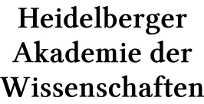Purposes and Activities
The Heidelberg Academy of Sciences and HumanitiesThe Heidelberg Academy of Sciences and Humanities was established in 1909 in the tradition of the Kurpfälzische Akademie (Academy of the Electoral Palatinate) founded in 1763 by Elector Carl Theodor. Throughout its existence the Heidelberg Academy has upheld its allegiance to the purpose for which it was originally constituted: assembling the outstanding scholars and scientists of the state of Baden-Württemberg for cross-disciplinary exchange and independent research. Like its seven counterparts in other German states (Berlin, Göttingen, Munich, Leipzig, Mainz, Düsseldorf and Hamburg), the Baden-Württemberg State Academy in Heidelberg is a member of the Union of German Academies of Sciences and Humanities. It is both a scholarly society in the traditional sense of the term and a modern non-university research institution. The Academy organises scholarly and scientific symposia and public lecture series. At the same time it is dedicated to the encouragement of young scholars and scientists, maintaining to this end a Junior Academy of its own, supporting conferences organised by young scholars and scientists and awarding research prizes.
A scholarly society in the grand traditionIn its sessions (plenary and sectional) the Academy serves its members as a forum for regular interdisciplinary discussion of the issues and findings generated by academic research. The full members of the Heidelberg Academy are scholars and scientists from the state of Baden-Württemberg elected on the basis of their outstanding achievements in the sectors they represent. In addition, the Members’ Assembly can elect corresponding members from all over the world. The Academy is sub-divided into two Sections, the Philosophical-Historical Section and the Mathematical-Scientific Section. At present it has 190 full and 70 corresponding members from all walks of scholarly and scientific endeav- our. The range and variety of the research areas involved give the Academy unparalleled opportunities for a form of scholarly and scientific exchange and cooperation that transcends the boundaries traditionally imposed on academic disciplines, Faculties and universities.
A modern research institutionAt present the Academy runs 20 ongoing research projects involving some 230 staff members. The range of these projects is wide indeed. The academic responsibility for the individual projects lies with supervisory Commissions made up of Academy members and external experts. These 22 research projects are described in this brochure.
Support for young Academics and ScientistsOne of the Academy’s central concerns is providing support for Baden-Württemberg’s young scholars and scientists. Since 2002 the „WIN-Kolleg“ Junior Academy has promoted integrated interdisciplinary research on topical issues organised and conducted by young academics. So far, a total of ten cross-disciplinary projects running for a maximum of five years have been successfully sponsored. They centre on three main subjects: “Brain and Mind: Physical and Psychic Functions of the Brain”, “Cultural Foundations of European Unification” and “The Human Life Cycle: Biological, Societal and Cultural Aspects”. |

